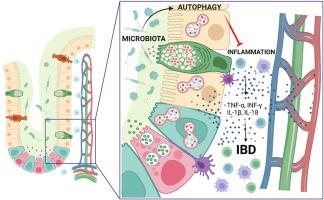肠道微生物群、免疫系统和自噬在炎症性肠病发病机制中的作用:分子机制和治疗方法
引用次数: 0
摘要
肠道微生物群、肠道上皮细胞、先天性免疫系统和适应性免疫系统之间的相互协作决定着肠道平衡的维持。对这种紧密对话和维持细胞平衡过程(如自噬)的任何干扰都可能导致免疫反应失调,影响有害细菌的清除,从而导致微生物菌群失调,引发慢性炎症。肠道菌群失调与胃肠道炎症性疾病密切相关,其中包括炎症性肠病(IBD)。本综述讨论了有关 IBD 的现有知识,从高危患者的遗传背景到该疾病的分子机制、微生物菌群的贡献以及自噬在肠上皮稳态中的作用。此外,我们还说明了旨在恢复 "抗炎 "微生物群与宿主之间有益串联的靶向营养方法的最新进展。对 IBD 分子发病机制的分析将有助于确定遗传和饮食相关的风险因素,从而提出预防和控制疾病的个性化策略,在长期维持缓解阶段的情况下提高生活质量。本文章由计算机程序翻译,如有差异,请以英文原文为准。

The role of gut microbiota, immune system, and autophagy in the pathogenesis of inflammatory bowel disease: Molecular mechanisms and therapeutic approaches
The crosstalk between gut microbiota, intestinal epithelial cells, and innate and adaptive immune system governs the maintenance of the intestinal homeostasis. Any interference in this tight dialogue and in the processes preserving cellular homeostasis (e.g., autophagy) may dysregulate the immune response and impair the clearance of harmful bacteria favoring the dysbiotic alteration of the microbial flora that leads to chronic inflammation. Gut dysbiosis is strongly associated with gastrointestinal inflammatory disorders, among them the inflammatory bowel disease (IBD). This review discusses the current knowledge on IBD, from the genetic background of high-risk patients to the molecular mechanisms underlying the disease, the contribution of the microbial flora, and the role of autophagy in intestinal epithelia homeostasis. Further, we illustrate the state of art regarding the targeted-nutritional approaches aimed to restore the beneficial crosstalk between an “anti-inflammatory” microbiota and the host. Analysis of the molecular pathogenesis of IBD will help identify genetic and diet-associated risk factors and thus suggest personalized strategies to prevent and manage the disease to improve quality of life with long-term maintenance of the remission phase.
求助全文
通过发布文献求助,成功后即可免费获取论文全文。
去求助
来源期刊

Aspects of molecular medicine
Molecular Biology, Molecular Medicine
自引率
0.00%
发文量
0
审稿时长
38 days
 求助内容:
求助内容: 应助结果提醒方式:
应助结果提醒方式:


